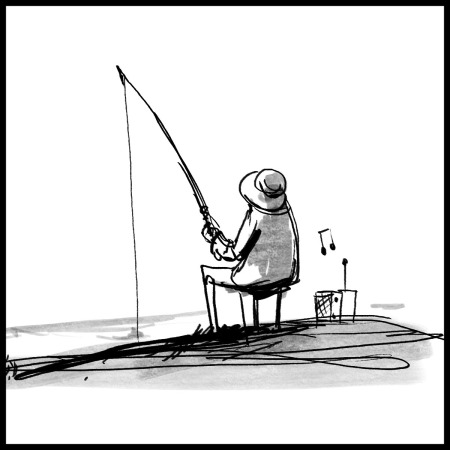Dear Husband, Partner, Boyfriend:
My wife asked me to write some advice for you, as someone who’s been a partner of a woman suffering from postnatal depression.
As if I know what I’m talking about. I may not be a certified professional expert source, but I have lived it.
Frankly, I’d like to just look you in the eye and say I know how bad it is. And I’m sorry. But--it really will get better. Your woman will return to you.
When I think back on that period of our life six years ago, my mind settles on one image: a snapshot of emotions taken over a bleak Christmas holiday. One night, out of frustration with this passive, dark creature that my wife had become, I vented my feelings. I knew I needed to be the support, the calm centre, a touchstone for her to hold on to--but I was tired. And I had had enough. Later I found her upstairs, cutting small slashes into her forearm with my craft knife.
I won’t forget that. You don’t really prepare for moments like that in a relationship, do you? You start in a rush of excitement and coiled potential, which plays out hopefully in a full and rich partnership. But--and here is where I will sound selfish--you will feel betrayed and abandoned by a partner with depression. You will be amazed that you, a pretty decent guy, are not able to fix this.
1.You can not fix her.
Face it. As a man, in an argument, your overriding need for process and parameters and a clear bottom line means that you think you can and must fix things now. I’m talking to the average guy; guys like me. If you’re a superstar listener and a rock-solid support you’ll be fine. But for the rest of you: you can’t fix her. She is fighting with thoughts that make no sense, overwhelming dread, numbness. This cannot be fixed by what you say. It will be healed over time. Resist the temptation to take control and straighten her thoughts out for her.2.Carry her burden.
I felt that Sarah really withdrew from me when she sensed my own withdrawal, my frustration with the months of waiting for her to be well--for her spark of vitality to return. She felt judged, another layer of failure to add to the tomb of thought she was struggling to climb out of. Depression is exhausting. Fighting it is a battle that needs reinforcements and nourishment. What can you do to stand beside her, carry her burden, like the strong ox that you are? You can take the kids off her hands. You can cook dinner. You can sit and read next to her. You can find the YouTube video of that comedian that she likes. You can take her out, and not talk about ‘it.’ You can let her lie in. You show her that you stand next to her, with her, carry the burden that she is carrying.3. Don’t judge her.
This is vital. She will do, say things that will make you feel like trash and the relationship feel like a sinking ship. The house will be empty of her life-giving charisma. You, feeling tired and hassled, frustrated, will start to compare her to other, maybe fictional, women and she will not match up well. No. That route is the wrong one. Don’t judge her. Forgo judgment completely. It’s a tough route to walk, but you can do it and she needs you to. It is not a case of seeing her at her worst. It’s more a case that she is not herself at all. But she will be back.4. Surprise her.
The pattern of the days for someone with PND/PPD can be overwhelmingly repetitive and void of joy. You might be tempted to hunker down and wait, allowing that pattern to stay the same until it's finished and the storm clouds have moved on. Actually, this is the perfect time to surprise her and keep her on her toes. You are reminding her that the day can be something that brings life and new things, however small. A note in the cutlery drawer, maybe. Or bigger surprises: that Christmas I mentioned earlier was followed by a three-day trip to a bed and breakfast on a Welsh beach. Sarah and I had for those three days a beautiful respite from the illness, discovering a new place together. That memory is much more powerful than the bad ones.5. This time, read the manual.
I don’t read the manual, do you? I prefer my expensive purchases assembled by instinct and impatience rather than thoughtful absorption of the instructions. If you are this type, then I suggest that you do read the manual on PND/PPD. Find out how it makes other mothers feel, and you’ll realize that this isn’t the great unknown after all. Talk to your family doctor. Speak to the health care professionals who are working with her. Look at online resources, especially those written from a dad’s perspective.
6. Take care of yourself.
I failed at most of these things. I learned slow, and with difficulty, but we are through. Sarah is entirely, utterly different now. She returned, as your partner will. Together, you’ll have some scars that a lot of relationships don’t experience. And you can be proud of them. You’re stronger than you were before.


I want to say that your words are beautiful and true. If any man read this and understood half of it, they would be a light at the end of the tunnel. Bravo!
ReplyDeleteThank you for writing this and being willing to share. My husband loved me through the mess that was PPD, and we got through it, but I wish he had read this.
ReplyDeleteThat was perfect and all dads should read this
ReplyDelete